Date: Wednesday December 5, 2012
Time: 8pm
Location: High Noon Saloon (map)
Field Notes from a Catastrophic Outburst Megaflood
Summary: Towards the end of the last glacial period, rapid (natural) climate warming led to increased melting of ice sheets, forming large glacial outwash lakes. Many of these lakes were held back by precarious ice dams that often failed due to various reasons I won’t go into here or why would you bother coming to the talk? Evidence of these large floods are found throughout the world, with most having left large, impressive land surface features. Consequently, this groundbreaking research has since led most civil engineers to agree that ice is an unsuitable building material for dams.
Presenter bio: Laura Hayes is a geomorphology graduate student at the University of Wisconsin. Her research interests include Quaternary dating methods, glacial geology, and late Pleistocene megafloods. To the people of Siberia, she is known as картофель идиот, which, she thinks, means ‘highly esteemed, beautiful lady scientist.’ It actually means ‘potato idiot,’ due to her inability to peel potatoes to the high standard of the 85th Motor Rifle Leningrad-Pavlovskaya Red Banner Division.
“L’art de la bise” or “Why do the French kiss so much?”
Summary: If you have ever been to France, you probably had to go through this awkward moment when French people will try to kiss you to say “Hi!” Audrey, a REAL French person, will share with you why French people kiss and how it is done. Be ready for some potential demos! Super-special guests will also demonstrate some common ways people from other countries greet each other.
Presenter bio: Audrey grew up in Strasbourg, France. Moved to Lyon, France when she was 8 and pursued a degree in Chemistry at CPE Lyon. As she was completing her Master Degree in Chemistry and Chemical Engineering, she had the opportunity to start her PhD in Materials Chemistry at the UW – Madison. Grad School in the US is just so bad ass! She enjoys playing with as many instruments as she is allowed to and hopes to graduate by 2015 while spreading her French Touch.
Selected Badasses of French Literature
Summary: The author may be dead, but in this selection of some of French literature’s wildest and weirdest writers, their life stories live on with their work. This talk will discuss anecdotes about writers from the middle ages to the present day. Come for the literary history, stay for the crime sprees, fortune hunting, sex, death, and plentiful chest hair!
Presenter bio: Rachel Tapley is getting her PhD in French literature at UW-Madison. She has never been successfully convicted of murder.
Date: Wednesday October 24, 2012
Time: 8pm
Location: High Noon Saloon (map)
A Brief History of Fandom
Summary: Hugo Gernsback published the 1st science-fiction magazine, Amazing Stories, in 1926. Moments later, SF fandom was born. Richard S. Russell, who lived thru and participated in much of it, reprises his 2008 fan guest-of-honor speech from Odyssey Con 8, at which he articulated his 3 Principles of Fandom: (1) All fandoms are created equal. (2) Seduce the young. (3) Always bring a book!
Presenter bio: Richard S. Russell is a long-time Madison science fiction fan who has worked on all the WisCons, Odyssey Cons, and Geek.Kons there have ever been. He is proud to have a pseudopod planted in media, literary, gaming, comic, costuming, convention, and fanzine subfandoms. He’s a former WisCon coordinator and Fan guest of honor at both X-Con and OddCon.
Exploration of Lightning Through the Eyes of a Chemist and Astraphobic
Summary: Lightning, a natural phenomenon that has been studied, worshiped, and even feared for thousands of years; however, have you ever wondered how lightning occurs and what effects it has on the Earth’s atmosphere? This presentation will explore the important role that lightning has played throughout history, as well as the science behind the flash of light, the roll of thunder, and the reactions it catalyzes in the Earth’s atmosphere. *Warning* this talk will debunk common myths which may or may not leave you disgruntled at having been duped for so long; however, it will equip you with lots of facts that can prove to be useful if you ever need to impress a potential mate while standing in an open field during a storm, which means you’re not the only idiot to walk around outside during a storm and you’re probably meant to be together.
Presenter bio: Michelle grew up in the small city of Chardon, Ohio, southeast of Cleveland. She went to Ohio University and graduated with a B.S. in chemistry in 2008 then decided she was not ready for the “real world” so decided to move to Madison, WI to attend graduate school for materials chemistry. Michelle is wrapping up her thesis research in metal oxides and their applications in renewable energy. After graduate school, she hopes to make enough money to support her beer-snobbery and expand her collection of stray animals.
Who’s Learning From Whom? How Machine Learning can help us understand human learning.
Summary: If you’ve got a smartphone in your pocket, you’re already carrying around a device that is learning in a way not possible just a decade ago. Who you like to call, what websites you like to visit, what messages you consider spam. But what if, in addition to this stuff, it knew that you wanted to learn something new, and could itself learn how to help you do that? (Some of you just said “Cool!” and some others “Creepy!”. Both reasonable.) Traditionally, Machine Learning (a subset of Artificial Intelligence) has been used as a toolset to do things like extract information from big data or automate decision making. Recently, the ideas and techniques from Machine Learning have been applied to human learning in an effort to better understand, and influence, human learning behavior. I will discuss some of the studies and what the future may hold for human/machine cooperative learning.
Presenter bio: Bryan is a PhD student, research assistant and lecturer in the Dept. of Computer Science, UW-Madison. He likes long walks, short algorithms and the Monty Hall problem keeps him up at night.
Date: Wednesday August 29, 2012
Time: 8pm
Location: High Noon Saloon (map)
Ruminations of a Former Beef Princess
Summary: We face a lot of options when we arrive at the grocery store meat counter. Besides different cuts of meat available, there can also be different grades and certifications assigned. In my talk I will explain what some of these credentials mean, such as the USDA’s grading criteria and the qualifications required for the Certified Angus Beef (CAB) Program – such as how beef does not have to be from an Angus animal in order to qualify as CAB! Finally, after visiting the meat counter I will move on to the rest of the grocery store as I touch on the many beef by-products stocked outside of the meat department..
Presenter bio: Caroline’s family has been raising Angus cattle since 1923, and beef cattle in general for a bit longer. Her parents met in the meat lab at Ohio State and will still occasionally process their own animals when the weather allows it, leading to the garage becoming a make-shift butcher shop during the winter months. While Caroline’s chosen field of study is chemistry, growing up she was active in the beef community and held such titles as Allen County Beef Princess, Black Swamp Angus Queen, and Miss Ohio Angus.
Sex and the Sick Bee
Summary: Using the beloved and timeless characters of the HBO comedy series as our guide, we will explore the beautiful evolutionary journey from single egg-laying sawflies to honey bee orgies. But it’s not all sex and nectar drinking in our honeycomb city, and just as Samantha had her breast cancer (SPOILER!), so too must the honey bee deal with her Colony Collapse Disorder. It’s a story of sex, drugs, deception, exploding males, and zombies. Just like any other episode of Sex and the City, only with three times the shoes.
Presenter bio: Ben Taylor is the Assistant Director of Education for the UW Materials Research Science and Engineering Center, but, even more so than jamming words into his job title, his real passion is for bees. After receiving his bachelor’s degree in entomology from the UW-Madison, Ben worked on a nine-month research project focusing on native bee pollination in Wisconsin’s apple orchards. Yes, he has been stung in the face. No, it was not a pleasant experience.
Coffee: Frag Faster, Brew Better, Sleep Never!
Summary: Do you worship the Holy Brew? Can’t start a day without it and wish they would hurry up and invent a coffee I.V.? Sick of constantly putting up with crappy coffee but not sure what to do about it? You’re in good company! This is a tribute to the Bitter Brown Bean’s care and preparation, and will enable you to take your own love affair to new jittery heights!
Presenter bio: Mike Rolfs is your average computer geek/musician/chef/gardener/woodworker/ fabricator/lumberjack/…actually no, he’s not much of an average anything. Mike is originally from Minnesota and after passing through Santa Fe, El Paso, Boston, he has come to rest in the Rolfs-family stronghold of Madison. These days he’s a network administrator by day and a roller derby referee by night, with a million plus other hobbies sprinkled throughout. And as we’ll soon discover, he’s a SERIOUS coffee addict.
Date: Wednesday June 27, 2012
Time: 8pm
Location: High Noon Saloon (map)
Stories from the Last Ice Age: Vegetation responses to the last global warming and species extinctions
Summary: If a tree grew in the forest 15,000 years ago, did it make a sound? And why should we care about long-vanished ecosystems anyways? In 20 minutes or less, I’ll make the case that the end of the last deglaciation is endlessly fascinating, both as a topic unto itself (Mammoths! Mile-high ice sheets! Migrating plants! Giant aphids that would tear your face off! [last one not true]) and as our one of the best model systems for understanding forest responses to climate change, species extinctions, human-driven shifts in fire regime, and other matters of pressing concern today.
Presenter bio: Jack Williams grew up wanting to be a mad scientist, but these days he is rarely more than mildly grumpy, at best. Jack is a professor of geography at UW-Madison and the current director of the Nelson Center for Climatic Research. Research interests include: paleoecology, paleoclimatology, global climate change, and vegetation dynamics, and pretty much anything else that intersects with these topics. See www.geography.wisc.edu/faculty/williams/lab/ and ccr.aos.wisc.edu for more info. Or follow his intermittent twitter feed @IceAgeEcologist
How to Revive a Nation: Ein Abend mit der Germans
Summary: With the presidential election in full swing we are constantly barraged with ideas as to which direction our country needs to take. Undoubtedly, everyone will claim their idea as the panacea for all that ails our country. How are we to sort through these various prescriptions? Unfortunately, I can’t help you there. What I can offer is a journey to a far away land (known as Germany) that once faced this very debate. In the early 20th century, many Germans felt that their country had gotten off track and proposed various ways to return her to her rightful glory. Perhaps we should shed bourgeois society by removing our clothing and worshiping the sun. Or maybe a quick war will sweep away the malaise and melancholy of modernity and catalyze a national revival. Indeed, the Germans tried it all and tonight we will consider their proposals for our own time and place. Tonight, we will revive our nation.
Presenter bio: Charlie Cahill is a PHD student in Modern European History at UW-Madison with a focus on 20th century Germany. Before moving to Madison Charlie lived in Germany for two years in order to study their mysterious ways. After resisting the siren call for the past four years Charlie is moving back to the promised land in the fall.
Creationism: When you don’t know the difference between The Flintstones and a National Geographic documentary
Summary: Why do forty percent of the American public believe the earth is only 6,000 years old, that humans and dinosaurs lived at the same time in the Garden of Eden, and that 4400 years ago eight humans took care of over fourteen thousand animals (and their poop) on a boat for a year while the entire Earth was covered with water? Why would anyone spend forty seven million dollars on a so-called museum promoting such ideas? Because they believe the book of Genesis is a science book, and the story of Noah’s Ark is historical fact. Cross over the to dark side from reason and rationality. Get ready for some zany creationist quotes and other factoids from the “field” of “Creation Science.”
Presenter bio: Skip Evans has been studying creationism for a couple of decades, and did so professionally as the Network Project Director at the National Center for Science Education in Oakland, California from 2001 to 2004. He currently lives here in Madison, basking in the over-educated, hippie glow and organizing Science Pub which brings scientists and the public together over food, beer and good times. He occasionally blogs at pandasthumb.org and maintains sciencedenial.com.
Date: Wednesday May 23, 2012
Time: 8pm
Location: High Noon Saloon (map)
Eine Kleine Nachtnerd: What Are You Made Of?: A Brief History of Microscopes and What They Are Good For: I Love Colons: Ha Ha
Summary: Most thinking people and even some politicians accept that living things are made of cells, cells are made of molecules, molecules are made of atoms…and the list goes on. But how do we know all this? In one form or another, the family of instruments we call microscopes have informed most of what we know about the world of the small, the tiny, and the truly itty-bitty. Together, we will explore the 400-plus-year history of the microscope (skipping a bit here and there) and see what the most cutting-edge microscopes of today can show us about what the universe is made of. During the course of the talk, there will be forty-one images, twelve facts previously unknown to you, and two jokes.
Presenter bio: Joe Yeager is a graduate student in chemistry at UW-Madison where he is attempting to complete the first half of as many projects as possible. He was born, raised, and schooled in Kentucky, and it was also there where he met his wife, Rachel, whom you may remember from that talk with all the historic porn. He has the head of a man, the body of a lion, the arms of a starfish, and the voice of an angel with bronchitis.
Animals and alcohol: the evolution of intoxication
Summary: Boozing beasts give us insight into the cause of and solution to all of life’s problems!
Presenter bio: Zach Throckmorton is a PhD candidate with UW-Madison’s Anthropology Department whose research includes the lighter side of biological interactions.
It’s the Clothes That Make the (Pac) Man: Masculinity and Early Videogame Characters
Summary: With the early limitations of videogame design, it was necessary to use overly emphasized features to underscore, enhance, and display the masculinity of characters like Pac-Man, Mario, Donkey Kong, and Ryu. With no clear genitalia, how do we know these four are male? How do heteronormative features such as a bow tie, a bushy mustache, or bulging muscles, overtly masculine names, and cliched male-female relationships gender these characters? This talk seeks to understand how and why we recognize Pac-Man, Mario, Donkey Kong, and Ryu as men, and what this means about our understanding of masculinity.
Presenter bio: Alexandra Newman is a second year Master’s student in the Department of Art History, working on her thesis entitled “The Trope of the Boy Adventurer: Tintin and Jonny Quest.” She studies French and American cartoons and comics, and American pop music ephemera. She spends her spare time watching reality tv and cartoons, trying to convince her boyfriend it’s “art historical research.”
Date: Wednesday April 11, 2012
Time: 8pm
Location: High Noon Saloon (map)
Multiple Choice Memory: The Joker and John Locke’s Account of Personal Identity over Time
Summary: The Joker is Batman’s greatest enemy and arguably the greatest comic book villain of all time. The character has appeared in dozens of classic stories such as Alan Moore’s The Killing Joke as a foil and antagonist for Batman…or has he? According to some accounts of personal identity over time, it seems that The Joker’s characteristic insanity might prevent him from being the same person over time. In my talk, I’ll discuss Locke’s account of personhood and personal identity and evaluate The Joker in light of Locke’s account. Also, there will be a surprising amount of dick jokes.
Presenter bio: Derrick Murphy is a philosophy graduate student at The University of Wisconsin, Madison. Derrick’s main interests are in metaphysics and philosophy of mind, with an emphasis on issues such as personal identity over time. Among other things, he reads and collects comics in his spare time, and boasts a collection that has all the first printings of the entire Crisis on the Infinite Earths series and Grant Morrison’s entire run on JLA. If you know what those are and why they might be important, it is unclear whether you should be congratulated or pitied.
Building the Tower of Babel: Why are there so many languages and why are some so damn complicated?
Summary: There are over 6,000 languages in the world. Why are there so many and why are some of them so weird and so complicated? Seriously, English is child’s play in comparison! For example, in English we say “this” and “that”, In Inuktitut, there are 88 (!) ways of specifying where “this” is. What’s up with that? This presentation will reveal how the heck someone (Gary!!!) can answer this question. Hint: there are children and immigrants involved. Curious yet!??!!!
Presenter bio: Gary Lupyan is an Assistant Professor of Psychology at UW-Madison. His mind has been so warped by science that everywhere he looks he sees experiments in the making. He also flies planes (and occasionally gives rides — ask him!).
Anything you can do, ants can do better: why ants rule and humans drool
Summary: Us… humans…we like to pat ourselves on the back, citing several accomplishments that make us superior and unique (e.g. modern medicine/antibiotic use, agriculture/domestication of crops, and complex social society). In addition, humans are “uniquely” capable of extraordinary, and sometimes shameful, tendencies (e.g. global colonization, slavery, and military defense). What you might not know is that these things are not unique to humans. In fact, they evolved in ant species millions of years before humans evolved. This presentation will reveal many of the extraordinary behaviors that ants exhibit, showing how these tiny creatures can be just as complex and interesting as us humans.
Presenter bio: Eric Caldera is a native Texan who is either well rounded or confused – he is a biologist, musician, and aspiring poet. As a doctoral candidate studying evolution, ecology and genetics at the University of Wisconsin-Madison, he has received the National Science Foundation predoctoral fellowship and doctoral dissertation improvement grant, and a National Institute of Health fellowship. For his research, Eric studies coevolution between ants and a complex of microbial symbionts, which combines fieldwork in neo-tropical rainforests with population genetics. Eric is also the guitarist in the Madison-based instrumental band El Valiente and plays guitar and sings in the singer/songwriter project Oedipus TX.
Date: Wednesday February 22, 2012
Time: 8pm
Location: Genna’s Lounge (map)
Lasers in Science Fiction: Can they really DO that???

Watch on Vimeo
Summary: When Goldfinger threatened to slice 007 in half with a laser, did James really need to fear for his junk? Could you really see a phaser beam when it’s fired? Could the Death Star really have blown up Alderaan, and come to think of it, can laser beams actually bend like that? Answers to these questions and more, plus plenty of videos of lasers blowing stuff up. You might even learn a bit of physics along the way, and I promise it will be totally equation-free!
Presenter bio: Jennifer Laaser is a grad student in physical chemistry at UW-Madison, where she spends most of her day playing with (guess what?) lasers. Contrary to popular wisdom, her last name has nothing to do with her choice of research topics, thought it is handy for helping people remember who she is!
Giants with Many Arms: Living, fossil, and mythic enormous squids

Watch on Vimeo
Summary: Enormous squids have inspired lore throughout history, from ancient myths to modern media hype. What are giant squids really like? Did their extinct kin also evolve into giants? What is the key to their monstrous growth? When will they strike next? Find out here!
Presenter bio: George Rothdrake is a non-cephalopod animal who loves the the living world. When not investigating and whipping up mass enthusiasm for a variety of earthly creatures, he busies himself working at grocery co-ops.
From Myth to Reason: The Earliest Greek Philosophers and the Always Amazing but Sometimes Crazy things they Said

Watch on Vimeo
Summary: Before Socrates, Plato and Aristotle set the stage for the next thousand years of philosophical and scientific inquiry, a handful of even earlier Greek thinkers, sometimes referred to as the Pre-Socratics, paved the way by developing new ways of explaining the world around them. This talk will examine what they had to say, what effect it had on their successors, what relevance it still has for us today, and why it is that we think of the Pre-Socratics as the first “masters of rational thought.”
Presenter bio: Tim Aylsworth is a graduate student in philosophy at UW. He specializes in the history of philosophy with a particular emphasis on 17th and 18th century thinkers. When not pondering the perennial questions of philosophy, he likes to nerd out about language (he’s an aspiring polyglot), history, music, and whatever else he can get his nerdy hands on.
Date: Wednesday January 25, 2012
Time: 8pm
Location: Genna’s Lounge (map)
Promiscuity Promotes Biodiversity: And Other Tales of Sex and Speciation
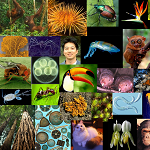
Watch on Vimeo
Summary: Since before Darwin, biologists have sought to understand how the extraordinary diversity of life on earth came to be. We’ve figured out that, when it comes to speciation, it really is all about sex (or rather lack thereof). This talk will explain different speciation mechanisms and the quest to identify ‘speciation genes’, touching on topics such as sperm competition, sexual conflict, and ligers.
Presenter bio: Leslie Turner is a postdoctoral fellow in Genetics at UW-Madison, studying the genetic basis of species barriers in house mice. She’s been an academic nomad for many years, having lived in 6 states and 2 countries during her training. Hopefully she’ll survive the grueling academic job market and end the moving streak someday soon.
Internet Agoraphobia or: Why You Should Be Afraid to Venture Into the World Wide Web

Watch on Vimeo
Summary: The internet has become an integral part of our daily lives — we use it for communication, we make purchases, we upload files. But in this normalcy, do we ever stop and think about where our personal information is going and who might have access to it? Surely if we did, we might want to stay “indoors”. In this talk, you will learn how to best protect yourself from the hazards that await you on the World Wide Web.
Presenter bio: Based in Madison, Rob is a software developer who devotes much of his free time writing FLOSS (free/libre/open source software) and the rest informing people how to practice safe hex (computing, that is). Rob currently works at INOC on the East Side, where he writes web applications and server-side programs.
Cows Shit Gold: The Magic of Manure
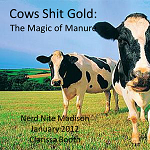
Watch on Vimeo
Summary: “Pasture Patties.” “Cow Pies.” “Meadow Muffins.” No matter its name, cow manure is agricultural gold. For centuries, humans have been using manure as a fertilizer for land. Cow dung is rich in nutrients and microbes eager to unknowingly cultivate farmland. But in addition to its use as a crop dressing, manure has other lesser known applications from serving as an insect repellent to a biofuel. In this talk we’ll learn just how valuable manure is, both historically and to modern science, and hopefully learn plenty of synonyms for “poo” along the way. So grab a stool, take a load off, and let us enrich your pootential.
Presenter bio: Clarissa Booth is an environmental toxicology graduate student at UW. She’s taking care of business by using enzymes from manure and compost to degrade recalcitrant proteins. She frequently collects prairie pancakes to study, but for eating, says blueberry pancakes are her favorite.
Date: Wednesday November 30, 2011
Time: 8pm
Location: Genna’s Lounge (map)
Smut and Sluts: How Reading Novels Will Turn You into a Sex-Crazed Maniac

Watch on Vimeo
Summary: New reading practices and the rise in popularity of the novel caused 18th century moralists to panic that novels might be transforming docile and virtuous women into hysterical nymphomaniacs with no regard for societal rules. Meanwhile, libertine authors were writing—and illustrating—erotic novels with exactly that goal in mind. Can reading really turn you into a sex-obsessed madwoman? Is the novel the first step toward total collapse of civilization? Is this talk just an excuse to display historical porn in public? Discover the dangers of fiction before it’s too late!
Presenter bio: Rachel Tapley is getting her PhD in French literature at UW-Madison. She is writing about seduction and the dangers of reading in 18th and 19th century novels. It is too late for her to benefit from her own warnings.
Sweeeeet! Science! The Chemistry of Candy
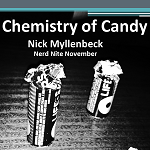
Watch on Vimeo
Summary: For milennia, one “spice” has stood tall against the rest, and rightly so. Without sugar, there’d be no candy, which means no Halloween, practically no Valentine’s Day, and thousands fewer good reasons to be obese or diabetic. It’s true, candy has imposed its will upon the weathered fabric of society and taken hold. Issues examined will include the awesome things that candy can do, mechanisms for killing someone with sweetness and how to mitigate chocolate-induced guilt.
Presenter bio: Nick Myllenbeck is a chemistry graduate student at UW and candy enthusiast (he says the sour ones are his type!) Nick enjoys thinking about chemistry that will solve the world’s problems and how Madison should be in California.
The History of the Vibrator
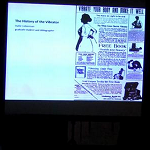
Watch on Vimeo
Summary: Half of Americans have used vibrators during their lifetimes, but few know the history of these pleasure-producing devices. In this talk, you’ll learn that Wisconsin played an important role in the history of the vibrator, while also seeing (and perhaps touching) a 100-year-old working vibrator manufactured in Racine, Wisconsin.
Presenter bio: Hallie Lieberman is the world’s leading (only) dildographer. She’s writing her dissertation on the history of sex toys. To learn more about the fine art of dildography, read her blog at https://www.dildographer.wordpress.com
Date: Wednesday October 19, 2011
Time: 8pm
Location: Genna’s Lounge (map)
The Virology of Werewolfism (Lycanosis): What Werewolves Have in Common with Cold Sores
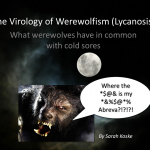
Watch on Vimeo
Summary: This highly publicized and dramatized disease has plagued humanity for centuries, yet little is known about what it is or what we’re supposed to do about it. In this talk you’ll learn the exact modus operandi and strategic plan of the virus that causes werewolfism, and how best to thwart it and save your life and the lives of countless other drifters and people with poor nighttime transportation habits.
Presenter bio: Sarah Koske is a student studying both the rare and more common animal diseases and zoonoses. She has an interest in non-traditional species (including, but not limited to, werewolves), as well as pathology, and the ecology of disease. Unfortunately, Sarah also has an imagination that cannot be controlled with corticosteroids. Sarah has been the winner of the NIH’s coveted “Most Original, Well-written, Yet Inordinately Ludicrous Grant Proposal” award since 2005.
Nerd Nite of the Living Dead: How to Survive a Zombie Apocalypse
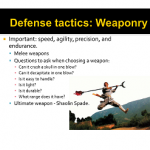
Watch on Vimeo
Summary: Do you have a strategy in place to survive zombie attacks? Do you want to be devoured by or converted into one of the living dead? If the answer to both of these questions is no, then you’re in luck. This Nerd Nite presentation will introduce you to the the origins of zombie lore and give you the essential do’s and don’t’s for short-term strategies against individual attacks as well as long-term success in a post-apocalyptic environment.
Presenter bio: Danielle started her zombie-preparedness training through taking courses in the English department at her undergraduate institution, the geographically-confusing Indiana University of Pennsylvania. She is now a PhD candidate in the philosophy department at UW-Madison, working on a dissertation in philosophy of braaaaaaaaaaaains
Sasquatch, Science, and Pseudoscience
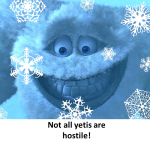
Watch on Vimeo
Summary: Is Bigfoot real or bullshit? By applying basic scientific principles and some biological anthropology, we’ll explore the legend of North America’s famous hirsute bipedal ape. We’ll find out how real scientists out fraudsters and see how fact is more intriguing than fiction.
Presenter bio: Zach Throckmorton is a dissertator at UW-Madison’s Department of Anthropology. He is Madison’s leading (i.e. only) authority on the evolution of the human foot.









